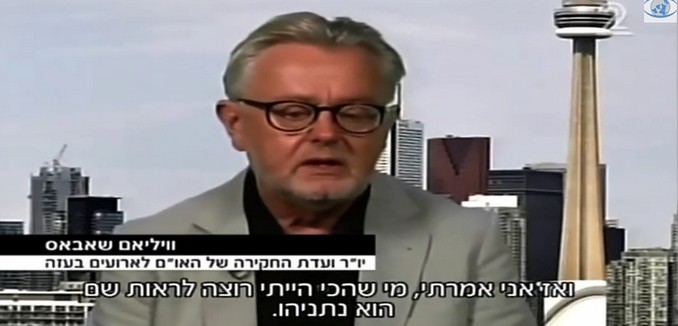Prof. William Schabas, the controversial head of the United Nations Human Rights Council (UNHRC) commission charged with investigating charges of war crimes alleged against Israel during Operation Protective Edge last summer, has resigned amid growing indications of bias.
Reuters reports:
In a letter to the commission, a copy of which was seen by Reuters, Schabas said he would step down immediately to prevent the issue from overshadowing the preparation of the report and its findings, which are due to be published in March.
Schabas’ departure highlights the sensitivity of the UN investigation just weeks after prosecutors at the International Criminal Court in The Hague said they had started a preliminary inquiry into alleged atrocities in the Palestinian territories.
In the letter, Schabas said a legal opinion he wrote for the Palestine Liberation Organization in 2012, for which he was paid $1,300, was not different from advice he had given to many other governments and organizations.
According to Schabas, “[t]he commission had largely finished gathering evidence and had begun writing the report.”
The revelation of Schabas’ work for the PLO is only the latest embarrassing revelation to emerge about the judge. Shortly after his appointment, Hillel Neuer of the watchdog organization UN Watch pointed out that Schabas had prejudged Israel’s actions.
In one interview Schabas gave during the early days of Operation Protective Edge, he suggested Israel’s military response to fire emanating from Gaza was disproportionate and therefore could not be considered legitimate self-defense.
Schabas in 2013 said that he looked forward to prosecuting Israeli Prime Minister Benjamin Netanyahu as a war criminal but asserted that Syria’s use of chemical weapons against civilians did not constitute a war crime. Schabas also acknowledged in an interview that there were “all kinds of double standards” at the United Nations. In the course of that interview he refused to call Hamas a terrorist organization.
In an ironic twist of history, it was discovered that when Schabas faced a hearing on charges of preventing a speaker from lecturing, he argued that the panel that was judging him was biased and should be dismissed.
In Everything You Need to Know About International Law and the Gaza War, which appeared in the September 2014 issue of The Tower Magazine, David Avraham Daoud explained why appointing Schabas undermines, not strengthens, international law.
But justice doesn’t need “twisting” and “maneuvering.” A jurist’s personal biases should play no part in a legal determination. The very idea of double standards in law is repugnant, oxymoronic and self-defeating. Law must be objective and blind. It cannot serve political ends, no matter how noble, and definitely not political power interests. In determining guilt and innocence, it cannot allow for the subjectivity exhibited by Schabas. Otherwise, countries that abide by international humanitarian law will be increasingly limited from defending their civilians against unscrupulous actors that ignore and exploit the laws of war. These actors will, in turn, be encouraged to commit further atrocities shielded in the knowledge that “power interests” will protect them from accountability. Legal military actions will be labeled “war crimes” because “political balances” demand it.
[Photo: UN Watch / YouTube ]




